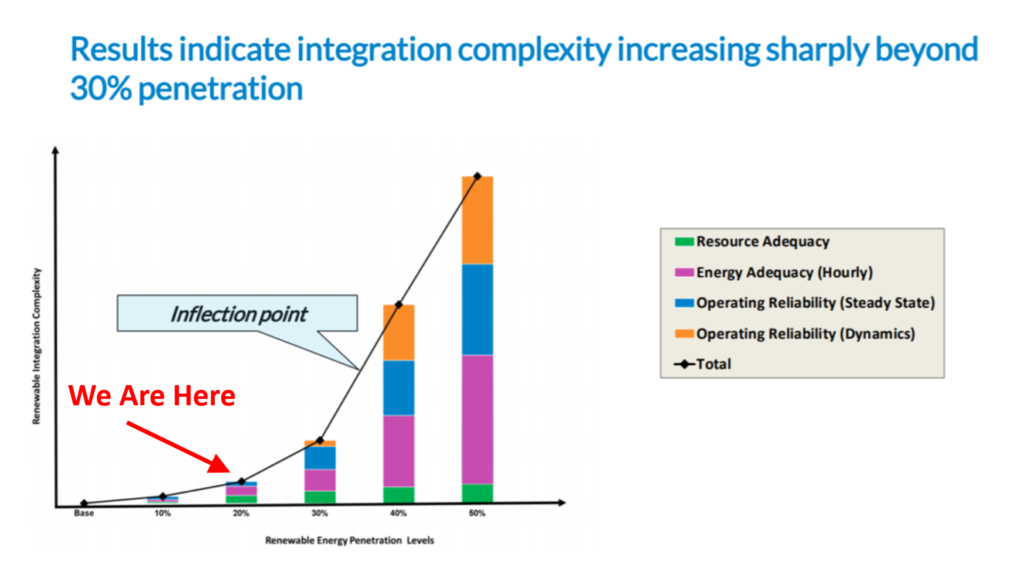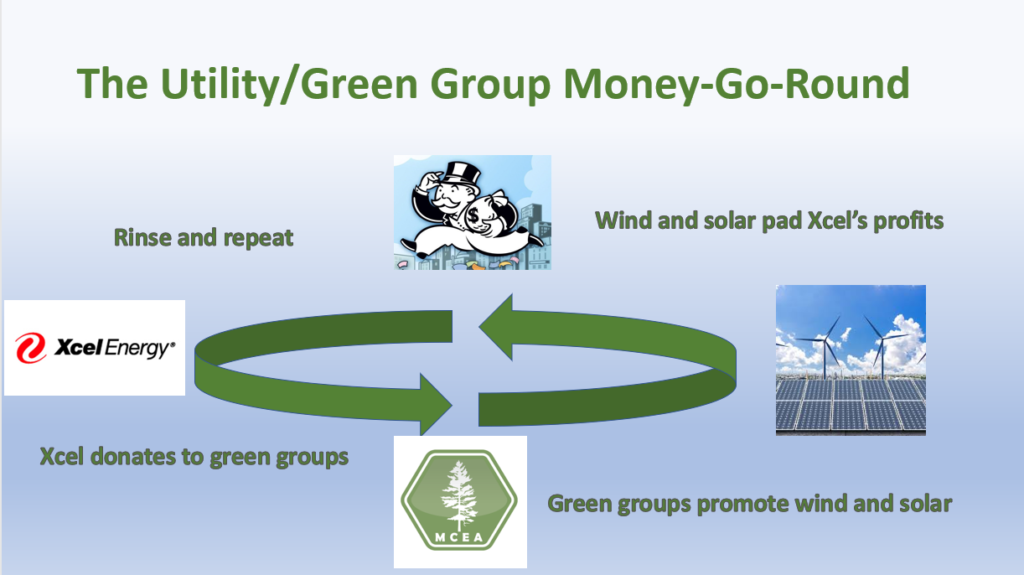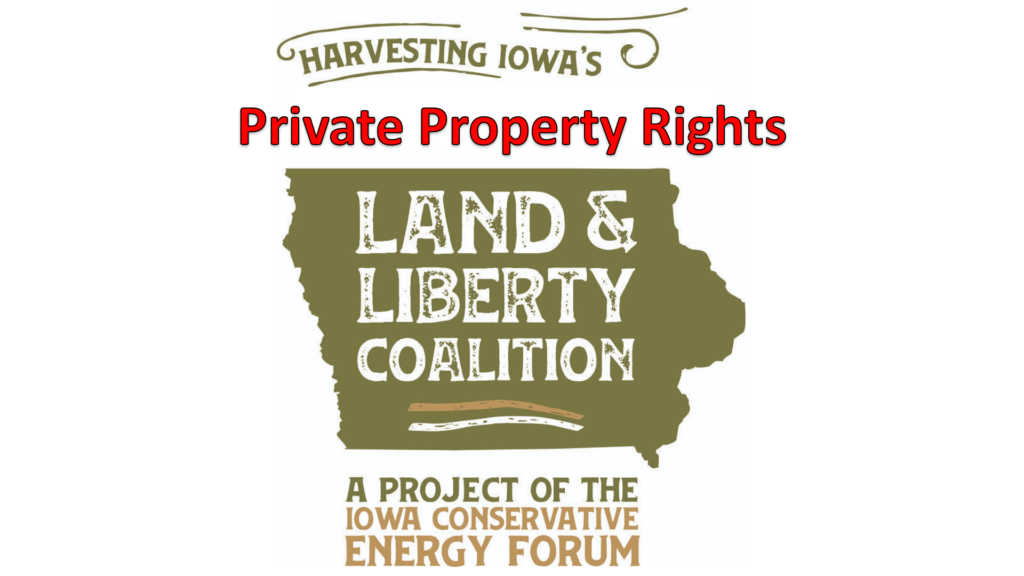Iowa Utility Board Proposes Use of Eminent Domain to Force Renewables On Landowners; Phony Conservative “Land and Liberty Coalition” is Silent
Property rights advocates in Iowa are furious about a proposal by the Iowa Utilities Board, the Iowa version of Minnesota’s Public Utilities Commission, to allow utility companies to use eminent domain to take the land of private citizens, without their consent, to facilitate more wind and solar development.
Interestingly, a group called the Iowa Land and Liberty Coalition, which portrays itself as a conservative champion of private property rights in the Midwestern energy space, has been silent about this development. Their silence suggests the group is less interested in property rights than they are about promoting renewable energy by any means necessary.
Local Opposition to Eminent Domain
Local landowners are concerned that the proposal would force them to host renewable energy projects against their will. According to an article at Farmprogress.com:
“This means even if you do not give a wind developer or utility company access to your land, the IUB could — according to their proposal — still run transmission lines through your property because they claim wind energy is a public utility.”
Wind and solar facilities have garnered increasing opposition throughout the country. In some instances, this opposition has led to local ordinances being passed outright banning future development of wind and solar projects, which was the case in San Bernardino County, California. Other areas have passed restrictions on how close wind turbines can be located to neighboring properties and enacted limits for noise and shadow flicker.
In other cases, individual landowners have simply said “No thanks,” to proposed wind turbines, solar panels, and transmission lines on their property. However, the rights of local Iowa landowners to say “No, thank you” to wind and solar projects are currently in the crosshairs of renewable energy special interests.
One wold expect liberal areas, like New York, to tread on the private property rights of farmers and landowners to further their renewable energy agenda, but Iowa is typically thought of as a red state, and conservative lawmakers generally respect private property rights more than their more-liberal counterparts.
According to the organization Conservatives for Property Rights: “eminent domain must be confined solely to serving a “public use,” takings should only benefit the public as a whole, the term “public use” must be narrowly construed.”
It is impossible to see how government land grabs for renewable energy meet this definition.
Rising Electricity Prices Are Not a Public Good
Renewable energy projects increase the cost of electricity by adding more capital costs to the electric grid, and these costs are paid for by raising electricity prices. The weather-dependent nature of wind and solar means that we still need reliable sources of electricity for when the wind isn’t blowing or the sun isn’t shining, and wind and solar also require more transmission capacity, which increase costs.
According to the regional grid operator, the Midcontinent Independent Systems Operator (MISO), the challenges with integrating more renewables to the grid increase exponentially over time, vastly increasing the cost of doing so.

While most of the public is harmed by increasing concentrations of renewable energy on the grid in the form of higher electricity prices, the benefits are concentrated among a small sub-population of the public.
This subpopulation includes the utility companies who increase their government guaranteed profits by building more infrastructure, the companies, like Warren Buffett’s Berkshire Hathaway, that use the subsidies generated by wind turbines to reduce their taxable income, the landowners who host the wind turbines, transmission lines, or solar panels, and lastly, the renewable energy special interest groups who receive funding from utilities to continue to advocate for more rules and regulations requiring the use of renewables.

How Can “Conservative” Groups Stay Silent About Eminent Domain?
Opposing state-government land grabs, which would primarily benefit a few special interest groups at the expense of private property rights, should be a cause that all conservatives should support.
However, the Iowa Land and Liberty Coalition, which is a project of the Iowa Conservative Energy Forum, a sister organization of our friends at the Minnesota Conservative Energy Forum (MNCEF), has been dead silent on this important property rights issue.
The fact that this group has been eerily quiet regarding the use of eminent domain is quite curious, considering the mission statement of the organization reads:
The Land & Liberty Coalition (L&LC) is a state-based group of local citizens, across the midwest, who support utility-scale renewable energy developments. The coalition consists of farmers, land owners, and key stakeholders who are concerned about protecting their private property rights, developing their communities, and being good stewards of the land.
You can find an L&LC chapter in the following states: Indiana, Iowa, Michigan, Minnesota, Ohio and Wisconsin.
If the Land and Liberty Coalition was truly a conservative group concerned about private property rights, they would forcefully argue in favor of allowing landowners to politely decline a transmission line, wind turbine, or solar facility being plopped on their property.
The fact that they are silent on this issue is yet another line of evidence supporting the argument that groups like MNCEF and the Land and Liberty Coalition are not conservative at all. In reality, these groups are liberal funded front groups who use conservative-sounding language and quotes from Ronald Reagan to advance the agenda of liberal environmental groups.

Conservatives aren’t stupid, and they can see through these Astroturf attempts to increase the amount of unreliable electricity on the electric grid.